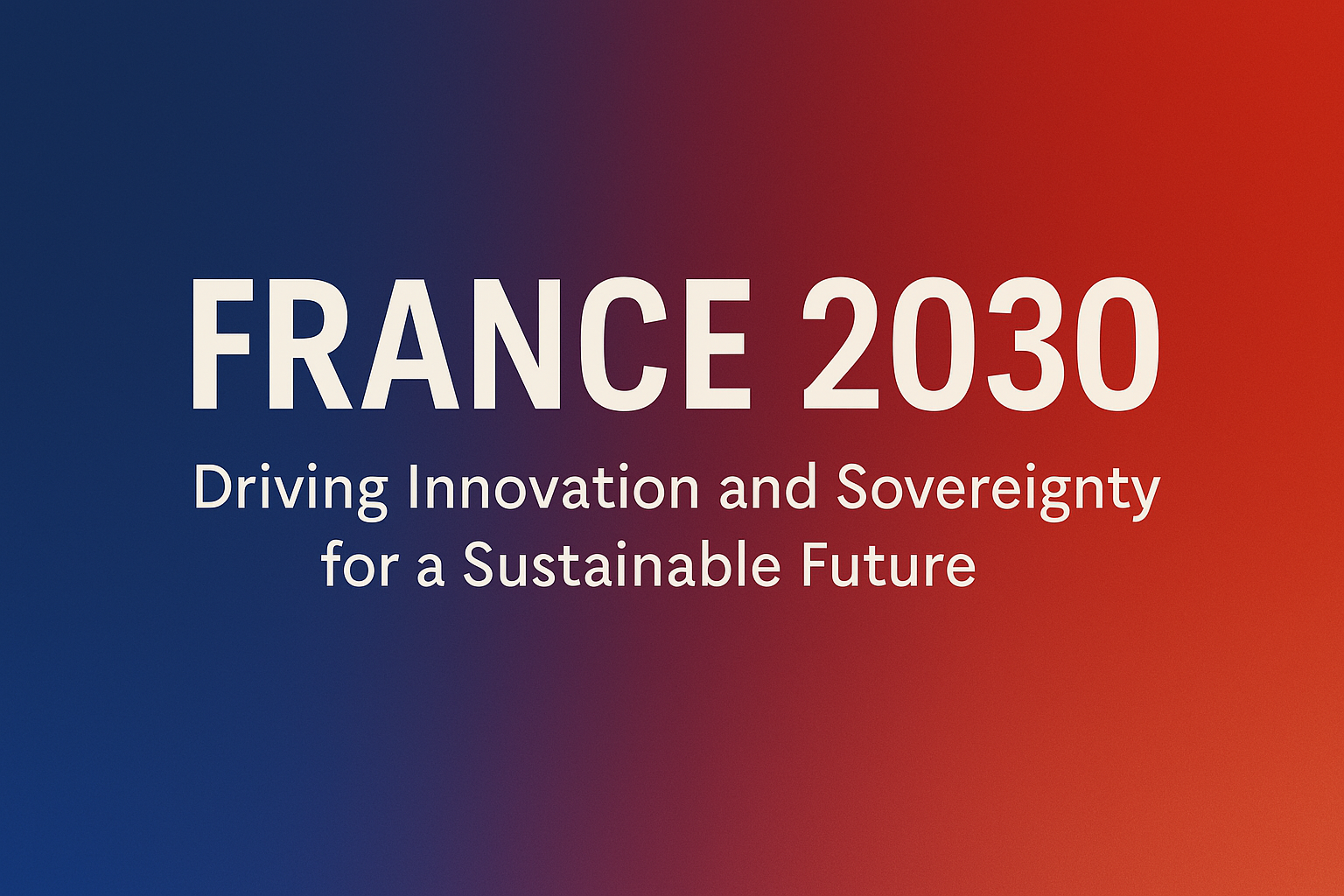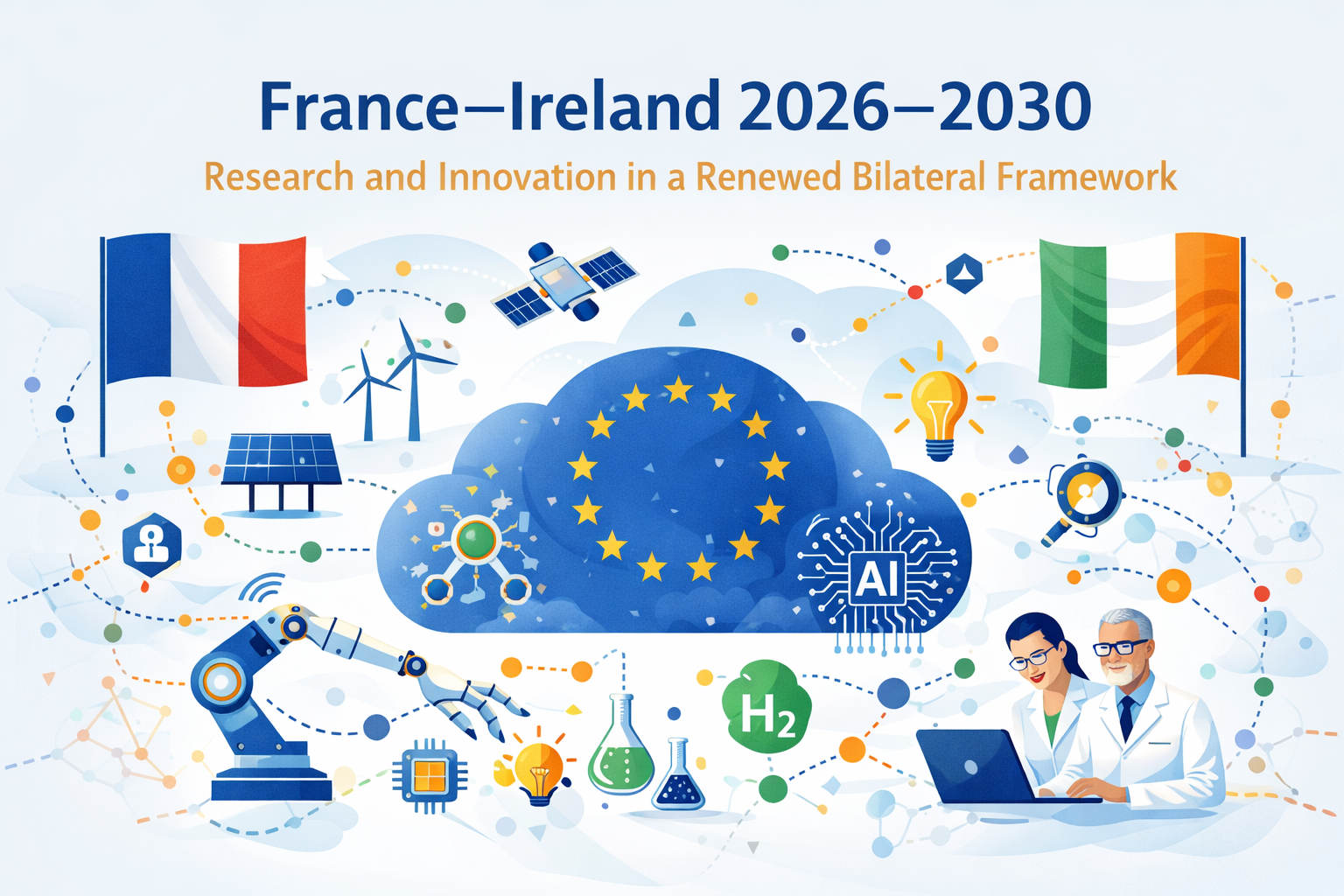
France Stratégie releases a midterm report on France 2030, the €54B plan to drive innovation, sustainability, and industrial renewal. A key moment to assess France’s progress toward becoming a leader in green, digital, and sovereign technologies.
In an era defined by rapid technological advancements, environmental imperatives, and shifting global markets, national strategies for innovation and sustainability have never been more critical. France, responding decisively to these challenges, launched the ambitious initiative France 2030 in October 2021. With an investment budget of €54 billion over five years, this comprehensive programme seeks to position France as a leading nation in technological innovation, ecological transition, and industrial sovereignty.
Overview of France 2030
France 2030 embodies a bold, forward-looking strategy designed to transform key economic sectors through sustained innovation, industrial modernization, and sustainable practices. At its core, the initiative aims to bolster France’s industrial competitiveness, promote technological independence, and facilitate a resilient ecological transition. The programme identifies and targets specific sectors and technologies deemed essential for future competitiveness and sustainability.
The strategic framework of France 2030 is built around three fundamental pillars, each with precise objectives:
- Better Production: Accelerating the transition towards sustainable and competitive industrial production methods. Key targets include developing low-carbon mobility solutions (electric vehicles, battery technologies), clean energy solutions (green hydrogen, modular nuclear reactors—SMRs), and next-generation aeronautics.
- Better Living: Enhancing quality of life through cutting-edge innovations in health (biomedicine), agriculture (agri-tech solutions), and cultural industries (immersive and digital creative technologies).
- Better Understanding of the World: Establishing scientific and technological leadership in advanced exploration fields such as space research and deep-sea exploration.
Achievements and Key Performance Indicators
Since its inception, France 2030 has demonstrated substantial outcomes, highlighting France’s ability to rapidly and effectively mobilize extensive resources:
- Investment and Impact:
- Over €38 billion has been invested across more than 7,400 innovative projects nationwide, showcasing significant government commitment to innovation.
- Approximately 196,824 direct jobs have been created, with 156,009 of these sustained after project completion, significantly contributing to national employment stability.
- Filing of 6,103 patents, underscoring France’s robust innovation ecosystem and proactive protection of intellectual property rights.
- Sectoral Highlights:
- Automotive and Mobility:
- France achieved an impressive annual production of 640,000 electric vehicles, progressing steadily toward its ambitious target of 2 million vehicles per annum by 2030.
- Multiple major battery gigafactories (ACC, Verkor, Envision, among others) have been established or are in advanced stages of development, anticipated to create approximately 20,000 new skilled jobs, reinforcing France’s position in the electric mobility sector.
- Green Energy and Decarbonisation:
- Successfully established 0.414 GW of electrolyser capacity dedicated to green hydrogen production, with additional substantial capacity currently under development, affirming France’s leadership in renewable energies.
- Annual industrial CO₂ emissions have been reduced by 7.2 million tonnes, a significant achievement aligning with the ambitious objective to reach an annual reduction of 11 million tonnes by 2030, thereby greatly contributing to national and European climate goals.
- Healthcare and Biotechnology:
- France has ascended to the second position in Europe for biomedicine production, achieving domestic production of 47 different biomedicines. This significant leap highlights France’s rapidly advancing capabilities in biotechnology and pharmaceutical manufacturing.
- Five major bioclusters and 12 new hospital-university research institutes have been established, significantly enhancing France’s healthcare innovation ecosystem and providing critical support infrastructure for biotech R&D.
- Digital and Quantum Technologies:
- Approximately €3.4 billion has been strategically invested in artificial intelligence (AI) and quantum computing advancements, reflecting a major commitment to securing technological sovereignty and fostering global competitiveness.
- French enterprises currently hold a substantial 16% share of the global quantum technology market, showcasing France’s emerging global influence and strong potential for future leadership in quantum innovation.
- Automotive and Mobility:
Governance, Implementation, and Monitoring
The governance of France 2030 is structured to ensure both strategic coherence and operational agility, combining top-level political oversight with decentralised execution and rigorous evaluation mechanisms.
The programme is coordinated by the General Secretariat for Investment (SGPI), operating directly under the authority of the Prime Minister. This positioning ensures strong political backing and facilitates cross-ministerial coordination across the various sectors addressed by the plan.
Strategic execution is delegated to a network of key national agencies:
- Bpifrance, the public investment bank, leads funding and support for innovation-driven businesses and startups.
- ADEME (Agency for Ecological Transition) manages programmes linked to energy efficiency, decarbonisation, and green innovation.
- ANR (National Research Agency) supports scientific excellence through academic and collaborative research funding.
- Caisse des Dépôts et Consignations, a major public investor, finances long-term infrastructure and territorial innovation projects.
Project selection under France 2030 follows open, competitive calls for proposals, ensuring transparency and excellence. Evaluation criteria include technological maturity, economic potential, alignment with environmental goals, and capacity to generate broad societal impact.
Oversight is provided by the Comité de surveillance des investissements d’avenir (CSIA), an independent committee comprising parliamentarians, scientific experts, and industry leaders. This body evaluates the effectiveness of investments along six analytical axes, including:
- Economic efficiency and fiscal impact
- Ecosystemic and industrial coherence
- European strategic alignment
- Leverage effect on private funding
- Operational performance
- Scientific and technological foresight
This monitoring framework ensures that France 2030 remains a dynamic, results-oriented initiative capable of adapting to emerging challenges and opportunities.
Collaborative Opportunities with Ireland
The comprehensive nature of France 2030 presents numerous opportunities for collaboration between Irish and French enterprises, research institutions, and governmental bodies. Both nations share complementary strengths in technology, innovation, and sustainability, creating an ideal foundation for bilateral partnerships.
France’s focus on industrial sovereignty, climate action, and digital transformation resonates with Ireland’s strategic goals as outlined in the White Paper on Enterprise and Enterprise Ireland’s Strategy 2025–2029. These commonalities open the door to a range of targeted, high-value collaboration areas:
· Green Hydrogen and Renewable Energies: Irish companies and research centres working on clean energy solutions could collaborate with French-led projects in hydrogen production, battery storage, wind energy (including floating wind), and sustainable fuels. French initiatives such as the Genvia gigafactory and Masshylia project provide ideal counterparts for Irish expertise in offshore wind and smart grid systems.
· Biotechnology and Healthcare Innovation: Ireland's strong pharmaceutical and medtech sectors could find fertile ground for cooperation in France’s expansive biotech landscape. Joint ventures in clinical trials, medical device design, and bio-manufacturing—leveraging France’s bioclusters and innovation hospitals—could enhance transnational research capabilities and market access.
· Quantum, AI, and Digital Sovereignty: With major investment in quantum computing and AI, France offers a dynamic field for collaborative innovation. Ireland’s emerging ecosystem in data science, cybersecurity, and software engineering can complement French breakthroughs in photonic qubits, edge computing, and trusted AI systems. Opportunities include Horizon Europe partnerships and joint ventures in quantum software, infrastructure, and use cases in finance, healthcare, and energy.
· Cultural and Creative Industries: Both countries are investing in immersive technologies and digital content creation. Partnerships between French immersive studios and Irish game developers or media companies could yield rich co-productions and export-ready cultural experiences.
· Education and Talent Development: Programmes such as France’s "Compétences et métiers d’avenir" and Ireland’s Human Capital Initiative (HCI) offer a base for exchange of best practices, joint curricula in deeptech disciplines, and student/researcher mobility.
By aligning institutional efforts, public funding tools, and entrepreneurial ecosystems, France and Ireland can jointly drive innovation that meets shared European and global challenges.
Conclusion
France 2030 is a forward-looking initiative designed to meet pressing economic, technological, and environmental challenges while laying the foundation for future resilience and innovation. Rather than a static blueprint, it offers a flexible, evolving framework that welcomes diverse partnerships and cross-border collaboration.
For Irish stakeholders, the programme opens valuable avenues to engage with a large-scale, well-structured innovation ecosystem. At the same time, Irish expertise in fast-growing sectors such as digital services, medtech, and sustainable finance can bring complementary strengths to French initiatives.
This reciprocal dynamic—built on shared values, economic ambition, and European cooperation—creates fertile ground for long-term partnerships. Whether through co-funded R&D, joint industrial ventures, or educational exchanges, France 2030 and Ireland’s innovation strategies have clear potential to reinforce one another.


